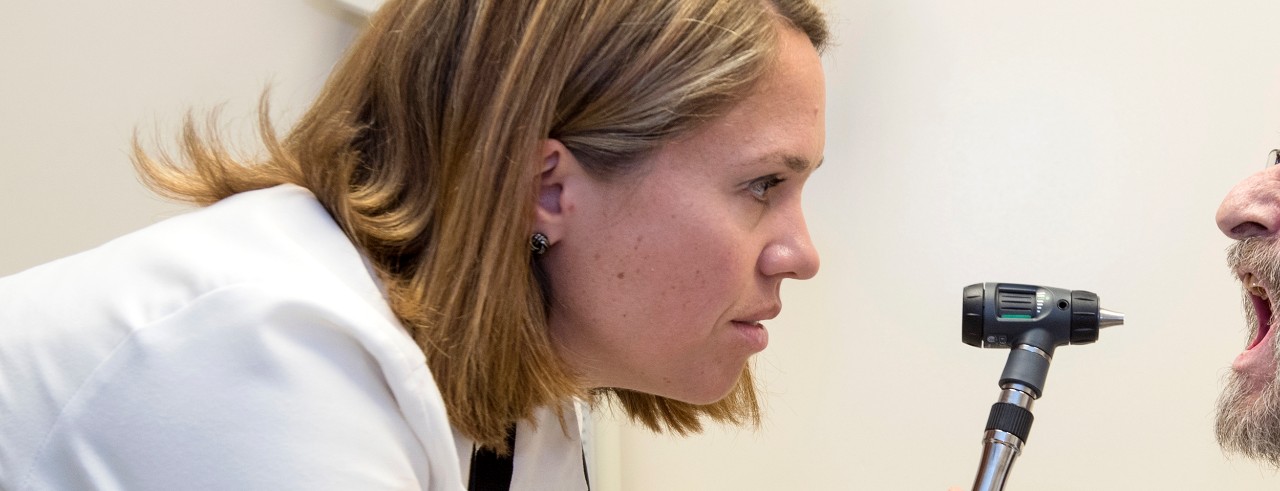
UC research: Immunotherapy safe for patients with COVID-19, cancer
Initial findings show that immunotherapy for cancer won’t worsen complications for COVID-19 patients
Preliminary data from researchers at the University of Cincinnati Cancer Center show that immunotherapy doesn’t necessarily worsen complications for patients with both COVID-19 and cancer.
This data is being presented by Layne Weatherford, PhD, UC postdoctoral fellow, at the American Association for Cancer Research Virtual Meeting: COVID-19 and Cancer, Monday, July 20.
Weatherford works in the lab of Trisha Wise-Draper, PhD, an associate professor of medicine, Division of Hematology Oncology, at the UC College of Medicine, UC Health oncologist and medical director of the UC Cancer Center Clinical Trials Office.
“Many COVID-19 complications result from an overactive immune response, leading to an increased production of proteins called cytokines,” Weatherford says. “Increased production of these proteins can cause issues like respiratory failure. Patients with cancer are more susceptible to COVID-19 infection as well as severe complications from it.
“Many patients with cancer are treated with immunotherapy, which activates the immune system against cancer to destroy it. In patients with both COVID-19 and cancer, our team thought that immunotherapy might increase the immune system response, which could already be overactive because of the COVID-19 infection.”
Wise-Draper says researchers thought treating COVID-19 patients with cancer immunotherapy might result in worsening patients’ health and overall outcomes.
“We are continuing to investigate whether immunotherapy causes an increased production of these proteins by immune cells from COVID-19 patients, but our initial findings are showing that immunotherapy is not significantly impacting it,” she adds.
Researchers are conducting this study using blood samples from patients with cancer taken from the UC COVID-19 biorepository, which Kris Hudock, MD, assistant professor in the Division of Pulmonary, Critical Care and Sleep Medicine at the UC College of Medicine, oversees.
“We are examining how immune checkpoint inhibitors, drugs that allow immune cells to respond more strongly, in combination with other treatments, like chemotherapy or radiation, affect the immune cells of COVID-19 patients and patients with both COVID-19 and cancer,” she says.
She and Weatherford add that their preliminary data show that an anti-diabetic drug, metformin, can reduce production of these proteins by immune cells of COVID-19 patients.
“These are promising, initial findings,” Wise-Draper says. “Additional research is needed, but our results show that we might be able to treat COVID-19 complications with metformin or a similar drug one day.”
Read more about COVID-19 and cancer-related research at UC.
Featured photo of Trisha Wise-Draper, MD, PhD, by Colleen Kelley/UC Creative + Brand.
Impact Lives Here
The University of Cincinnati is leading public urban universities into a new era of innovation and impact. Our faculty, staff and students are saving lives, changing outcomes and bending the future in our city's direction. Next Lives Here.
Stay up on all UC's COVID-19 stories, read more #UCtheGood content, or take a UC virtual visit and begin picturing yourself at an institution that inspires incredible stories.
Related Stories
UC’s Ground Floor Makerspace births combat robots
April 17, 2024
In the heart of UC's 1819 Innovation Hub lies the Ground Floor Makerspace, an advanced and active hub of ingenuity where students, faculty and the community converge to bring their ideas to life. This includes being the birthplace of robots much like miniature race cars, combating fender to fender in an enclosed boxing ring. Combat robots like UC's Maximizer will again be fighting for first place in the National Havoc Robot League (NHRL) competition, slated for April 20.
Medscape: Skin adverse events rare after immunotherapy to treat...
April 17, 2024
Medscape highlighted University of Cincinnati research published in JAMA Dermatology that found skin adverse events were rare following immunotherapy treatments for certain skin cancers.
UC researchers develop new CPAP device
April 17, 2024
Researchers at the University of Cincinnati are developing a VortexPAP machine that takes advantage of vortex airflow technology. A preliminary clinical study with current CPAP users demonstrated that the VortexPAP can deliver the pressure levels that are used in the subjects’ CPAP therapy, but the mask is more comfortable to wear. It has a minimalistic design that is less intrusive and barely touches the patient’s face.
